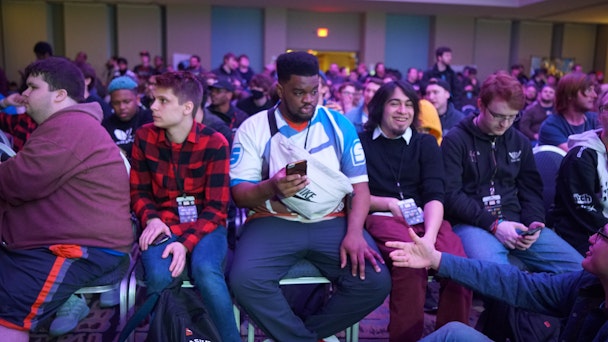What can marketers learn from gaming communities?
Gaming is one of the world’s most reliable forges of innovation. Not just the games themselves, but platforms, culture and communities too. Discord and Twitch, and noobs and nerfs, and caps and flossing have all changed the world in their own way. It’s an incubator for progress in marketing too, spearheading new formats and providing routes into culture at its source. So what can marketers learn from gaming? For The Drum’s Gaming Advertising Deep Dive, we asked six experts from The Drum Network.

What can marketers learn from the rich tapestry of gaming communities? / Stem List via Unsplash
Visar Statovci, co-founder and managing partner, Waste Creative
One thing that gaming companies have done incredibly well, and a massive reason as to why gaming blew up as much as it did, is the move from games as a product to games as a service.
You develop games with the community in mind. If you don’t have a community, you don’t have a game; you don’t have a business. We’re strategically involved with some of the biggest names, and they’ve gotten so good at having that feedback loop with the community; putting fans at the heart of building games.
Building services and products with our fans or communities in mind isn’t just a brilliant marketing line. If you build your business around it, the gains can be huge.
Advertisement
Jodie Fullagar, managing director, M&C Saatchi Sport & Entertainment
The one thing we can all learn is the power of community. If you put aside (just for a second) the barriers to inclusion, the ways some people are represented and the toxicity around some online experiences of certain games, there’s a huge amount of positivity in feeling connected to all kinds of people from all over the world with your shared mutual passion.
The democratization of that experience to be open to anyone who wants to play is powerful. What we’re increasingly trying to do with brands, certainly the ones that are trying to be in the hyper-culture space, is to say: ‘It’s not just about connecting your brand to a community, but connecting communities together.’
James Croft, senior brand strategist, Jellyfish
In gaming, most important is storytelling and powerful narrative. Games create immersive worlds and spaces that people really buy into.
We can learn from the gamification of experiences. You don’t have to create a complete game. It can just be slightly competitive or have an interactive element, like Netflix’s Bandersnatch: choosing your own story in different ways. It’s about finding new kids of storytelling.
When it comes to communities, actively contributing is key. It’s a two-way relationship: listen to what the community wants, and take on board their ideas with Q&A sessions, demos and testing.
Advertisement
Ting Zheng, client strategy senior lead, PMG
Other channels can’t replicate what’s happening in gaming. When we think about traditional TV, you’re just running an ad placement. When you think about sponsorships with sports teams, you slap a logo on a jersey. It can be a very one-way conversation.
Gaming offers new ways to add value. Social media helped us start that two-way conversation with liking and commenting. Gaming brings a third dimension: the aspect of play and of chatting across platforms, whether it’s Discord or the game itself.
It’s deeper, unique and engaging in a way that other channels can’t necessarily replicate. What we’re experiencing now is, ‘how do we just make sure that we’re adding value to everyone’s experiences v taking away from or making it about ourselves?’
Drew Townley, managing director, Kairos Group
Value exchange is key. I don’t think anyone else does it as well as gaming, but it’s non-negotiable in gaming.
Elsewhere, it can be very transactional. In other spaces, there has to be some form of value exchange: ‘What are we providing as a reward or incentive?’
Everyone’s looking at gaming and envying the length that people can stay engaged on a day-to-day or year-to-year basis. There’s no other industry or product that retains people like a triple-A gaming title. There’s a reason why Netflix’s chief exec came out and said its biggest competitor is Fortnite a year ago. Gaming’s fighting for more market-share and attention-share than any social media platform or any kind of mainstream media.
Suggested newsletters for you
Jeremy Cline, manager, strategy and insights, VMLY&R
Most brands would say that they have a brand community, but community managers in gaming social media deserve some of the highest accolades. They function as the mouthpiece of the brand to the consumer, and the mouthpiece of the consumer to the brand.
When the community develops a relationship with the brand à la social media community manager, how does this feedback loop impact the dynamic between customer and brand? Whether it’s making movie studios change character designs, NFTs, microtransactions, or loot boxes, there’s a power dynamic shift between brand and consumer on social media. Passionate and vocal consumers are now able to speak to product design or features and co-create the end product.
Communities, like any other relationship, require communication, boundaries and nurturing. Is there room to educate? Is there room to inform or demystify? To make people who feel like outsiders feel like insiders? Listen to your community. Evaluate your community. Nurture your community. You might just wind up with a hit hedgehog movie franchise.
Tehreim Asif, UX consultant, Foolproof
Rather than asking what gaming can teach marketing, is it worth thinking about using marketing as the driving force to change things that are wrong with the gaming industry? Filling in those gaps, whether that’s to do with diversity or accessibility. What if we change the narrative a little bit; what if we use marketing as the driving force to make the changes we dream of?
For more on all the different ways brands can advertise in gaming, from virtual billboards to product placements, social lenses and even games of their own, check out The Drum’s Gaming Advertising Deep Dive.
Content created with:

Waste Creative
Waste is an independent creative agency founded in 2006. We connect entertainment brands with their fans, to drive creativity, culture and commercial success. A...
Find out more
M&C Saatchi Group
We are a creative company with five specialist Divisions, connected through data, technology and culture, to deliver Meaningful Change for clients.
Find out more
Jellyfish
Jellyfish is a marketing performance company for the platform world, where success demands a creative, multi-platform mindset. We help brands thrive, by navigating,...
Find out more
PMG
PMG is a global independent marketing services and technology company that seeks to inspire people and brands that anything is possible. Driven by shared success,...
Find out more
Kairos Group
Led by experts with more than 100+ years of gaming and media industry knowledge, Kairos Group comprises multiple entities including Kairos Media, Kyma Media and...
Find out more
VML
VML is a leading creative company that combines brand experience, customer experience, and commerce, creating connected brands to drive growth. VML is celebrated...
Find out more
Foolproof
We are specialists in experience design. We create value for you by creating value for your customers.
Design know‑how
Use our talent and experience...

